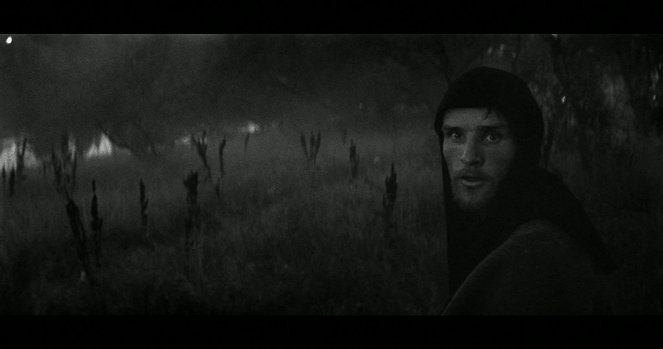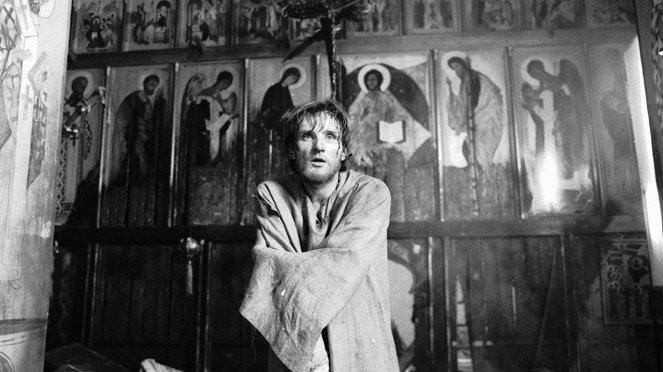Realização:
Andrei Arsenyevich TarkovskyCâmara:
Vadim YusovMúsica:
Vyacheslav OvchinnikovElenco:
Anatoly Solonitsyn, Nikolay Grinko, Bolot Bejšenalijev, Nikolay Burlyaev, Jurij Nikulin, Ролан Анатольевич Быков, Dmitri Orlovsky, Mikhail Kononov (mais)Streaming (1)
Conteúdos(1)
Andrei Rubliov, segunda longa-metragem de um dos grandes mestres da sétima arte, o russo Andrei Tarkovski, é um dos seus mais belos e aplaudidos filmes, tendo recebido em Cannes, em 1969, o prémio da Crítica Internacional. Considerado por muitos a obra-prima de Tarkovski, o cineasta aborda, através da história da vida do pintor do século XV Andrei Rubliov, a eterna questão do artista contra a autoridade, mas também a da solidão de um génio e a sua capacidade de se erguer acima das multidões, e os problemas da fé e da falta da mesma. O filme, que poderia ser descrito como um fresco ficcional constituído por episódios ligados por uma lógica mais poética que narrativa, foi apontado em 1995 pelos membros da Academia Europeia de Cinema e Televisão como um dos melhores dez filmes de sempre. O extraordinário actor Anatoly Solonitsyn, que dá corpo à personagem de Rubliov, tinha aqui o seu primeiro trabalho, que haveria de ser um dos vários que fez com Tarkovski. (Midas Filmes)
(mais)Vídeos (1)
Críticas (5)
Soviet film is simply not just communist propaganda, and Andrei Tarkovsky proves it more than many other creators. His films are very profound and you can find truly many things in them, in this case also a leaning towards God, or rather the question of the place of faith in human life. A strong film that surprisingly is not as magnificent as it might seem at first glance.
()
I am not a fan of similar stories (and I honestly don't like the mentioned Marketa Lazarova) and the only reason why I delved into several chapters of Eastern history was the reputation of Tarkovsky's masterpiece. That's why I welcomed the director's version, which exceeds half an hour in length, so that I could truly experience everything, and I still don't know if I made the right decision. I must admit that I mostly endured the first part. Life wisdom in the guise of a raw historical fresco is quite hard to swallow, and trying to grasp any passionate idea in every martyr's monologue just destroys me. What a surprise it was when the picture completely changed in the second part and the plot drew me in from the beginning, to the point where the Tatar raid became an unforgettable experience, for example. When I then enchantedly perceived the entire effort with the bell and its metaphorical resonance, I had the feeling that I had perhaps seen two different films stitched together under one title. However, the objections to the alienation and sometimes truly unbearable slowness remain, and considering that Solaris or the brilliant Stalker rely much more on imagination, I will still lean towards these later works.
()
Andrei Rublev is very important to Soviet, or rather Russian, cinema in that it is a monumental (and very expensive) medieval fresco. It was supposed to be a confident symbol of the post-war rise of Soviet film, representing the same thing for the era of Khrushchev's leadership as Ivan the Terrible did for Stalin and his gang. However, Tarkovsky guided the film toward religious symbolism and mysticism. After all, he originally named his work Andrei's Passion. The regime struggled for eight years to deal with the film, until it finally pardoned it. Tarkovsky dedicated a lot of energy to creating a sense of authenticity - he aimed for a raw, naturalistic style and used rough, unprocessed materials. It is undoubtedly a monumental work of national cinema, which would be difficult to create today. For me, it is Tarkovsky's most digestible film, but it is still true that the famous several-minute-long shots can tire out anyone. For me, the film represents a sympathetic and attractive version of the Middle Ages. The 205-minute director's cut proves that Tarkovsky did not take the viewer into consideration. Overall impression: 80%.
()
There are several simple reasons why I didn't like Andrei Rublev very much: 1) THE EMOTIONS: when in a 200 minute runtime there were only about 30 minutes that emotionally engaged me and made me sit firmly on my ass, I can’t be satisfied. 2) THE STORY: even though it’s extensive in time and narrative, rich in characters and period elements, formally it’s unbearably tedious, unnecessarily poetic and simply boring almost throughout. There are visible connections between the chapters and everything comes together to form a comprehensible whole, but Tarkovsky's interventions in the plot are often very insensitive, he only marginally introduces time jumps and the viewer often doesn't know what’s going on, or where and when. 3) THE MUSIC: while the uniquely bleak production design of the Czech film Markéta Lazarová relies heavily on a beautiful musical score, here this essential ingredient of all quality films is woefully absent (I regretted this especially in the final scene, where the enormous musical potential is revealed). What cannot be denied in terms of quality, however, is the polished, visually incredibly authentic and raw production design, which all great directors would have put behind them, and the historical verisimilitude in terms of the shape of secular life in the 15th century. But even that can't hide the sad fact that I endured most of the film rather resignedly and that I felt in completely different company than two weeks ago with the brilliant Stalker. 65%
()
A breathtaking cinematic poem. Raw, stark, timeless. In some ways, its cinematic language reminds me of Vláčil's Markéta Lazarova. A classic of world cinema.
()



Publicidade